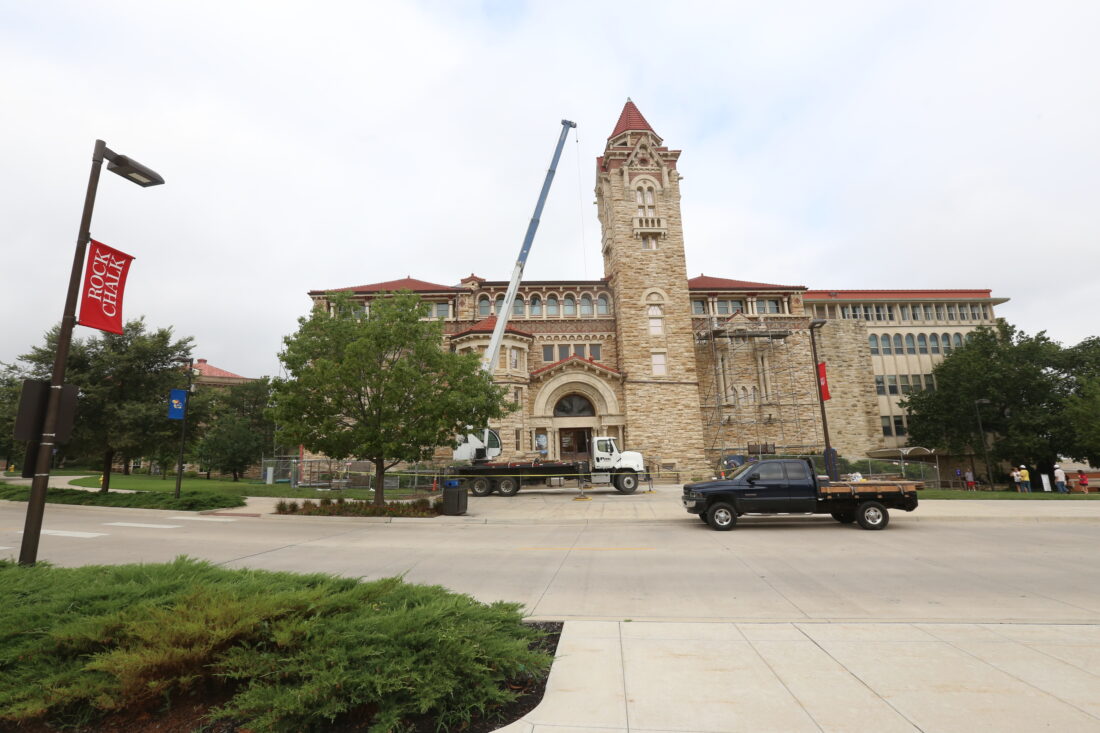Project to replace historic grotesques on KU’s natural history museum building wins state’s top preservation award

photo by: Chad Lawhorn/Journal-World
Sculptor Karl Ramberg, left, fits the grotesque to its base on Dyche Hall on Aug. 4, 2022.
A five-year project to re-create and reattach eight grotesques — stone statuettes of animals — to KU’s Dyche Hall has been awarded the state’s top historic preservation award.
The KU project won the Medallion Award from the Kansas Preservation Alliance earlier this month after a team of architects and stone carvers worked since 2017 on ways to replace the crumbling, intricately carved stone animals that long have been a prominent feature of Dyche Hall, which is home to KU’s Natural History Museum and the KU Biodiversity Institute.
The project involved a pair of local artists, Laura Ramberg and her brother Karl Ramberg, carving new grotesques from blocks of Cottonwood limestone, the type found in the Kansas Flint Hills. The task was to build near replicas of the originals. But that wasn’t an easy task, given that many of the grotesques had deteriorated to the point that key pieces were missing.
“Honoring the original stone carvers,” Laura Ramberg told the Journal-World in August 2022 when describing the hardest part of the project. “I had to imagine what had been there, or imagine the texture because the texture was gone, or the whole leg was gone or half the face was gone.”

photo by: Chad Lawhorn/Journal-World
Sculptors Karl and Laura Ramberg, have a last-minute discussion on Aug. 4, 2022 before a crane begins to raise the grotesque, which was covered as part of the lift.
The original grotesques were created by Joseph Robaldo Frazee and his son Vitruvius, and were installed as part of Dyche Hall in 1903, according to previous information from KU Endowment. Originally, there were 12 grotesques on Dyche Hall; however, four of the stone animals were removed in 1963 as part of an expansion of the building.
The eight that remain are: a bat/winged dragon; a zebra; a dog; a cat; an ape; an elephant; a rhino; and a lion. Some of the grotesques have specific writing on their chests, with the elephant sporting the “Rock Chalk” phrase, and the rhino displaying the phrase “J Hawk ?” It has never been clear what was meant by the question mark, KU Endowment reported in a previous article several years ago.
The KU project to replace the grotesques involved a combination of modern computer technology and Stone Age craftsmanship. Keith Van de Riet and Amy Van de Riet, faculty members at KU’s architecture school, led students in using 3-D computer technology to create models of the original grotesques.
Once the modeling was complete, the Rambergs began carving. Karl Ramberg used a fenced-in area in front of Dyche Hall to turn large blocks of white limestone into the rough shapes of each animal. Members of the university community watched as Ramberg, with the help of some students in related degrees, spent about 40 to 50 hours on each carving, KU Endowment reported.

photo by: Chad Lawhorn/Journal-World
The grotesque installed on Aug. 4, 2022 atop the Dyche Hall on the KU campus was of an ape, shown here in storage before moved outside for installation.

photo by: Chad Lawhorn/Journal-World
A close up view of an ape grotesque moments before it was hoisted atop Dyche Hall on the KU campus on the Aug. 4, 2022. Notice the fossil in the grotesque’s right eyebrow.
Laura Ramberg then took over to do the intricate carving and shaping of the stone. Using an air hammer and blueprints, Laura Ramberg spent about 165 hours on each grotesque, reported KU Endowment, which wrote the article as it was soliciting donations to fund the project.
By early August 2022, construction crews had begun lifting the 400-pound pieces of stone more than three stories in the air to reinstall the grotesques on Dyche Hall, the Journal-World reported.
That process involved lots of crane work and skilled masons to secure the grotesques atop their pedestals.
The Kansas Preservation Alliance recognized the years of work with its highest award at the Kansas State Preservation Conference on May 17 in Newton.
“Having the Medallion Award bestowed to the Grotesque Renewal Project is the perfect ending to an amazing project,” Amy Van de Riet said. “This award is a reflection of the stewardship of the KU Biodiversity Institute, the generosity of donors and the community of Lawrence to have retained such talented stone carvers.”

photo by: Chad Lawhorn/Journal-World
Construction workers await the arrival of the grotesque at Dyche Hall on the KU campus on Aug. 4, 2022.

photo by: Chad Lawhorn/Journal-World
Dyche Hall on the University of Kansas campus is pictured on Aug. 4, 2022 as construction crews install a grotesque on its new perch along east face of the historic building.

photo by: Chad Lawhorn/Journal-World
A member of the construction team pulls his tools up in a bucket as he prepares to install a grotesque atop Dyche Hall on Aug. 4, 2022.







